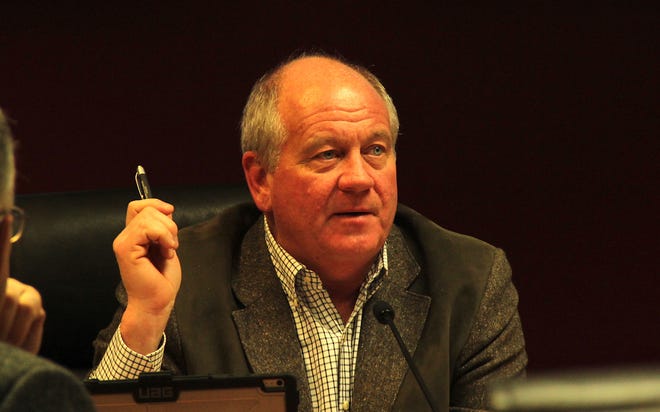Scott Walker appointee Frederick Prehn resigns from Natural Resources Board after over-staying term
 Laura Schulte
Laura Schulte

MADISON — Frederick Prehn, a holdover from the Walker administration who refused to step down from the state Department of Natural Resources’ policy-setting board after his term ended nearly two years ago, is resigning effective Dec. 30.
Prehn, who prevailed in a lawsuit seeking to oust him from the Natural Resources Board after his term ended in May 2021, informed Gov. Tony Evers of his intent to resign in a letter.
“It is time for the state legislators to act on Governor Evers nomination as soon as practical and it is now time for me to move on,” Prehn wrote.
Evers’ spokesperson Britt Cudaback said the governor’s office did not have additional comment.
Prehn, a Wausau dentist, was appointed by Walker in 2015. He refused to step down after his term ended, denying Evers’ appointee Sandra Naas a seat and maintaining a 4-3 majority for Republican appointees.
Prehn, after his term ended, cast the deciding vote to increase the quota for the state’s wolf hunt and to scrap limits of so-called forever chemicals in groundwater. Earlier this month, Prehn was part of a unanimous vote to restart the process of setting PFAS limits, a process that will take years to complete.
The Republican-controlled Senate refused to confirm Naas and Prehn argued he didn’t have to leave his seat until his replacement was confirmed. Democratic Attorney General Josh Kaul sued seeking to force Prehn off the board, but the Supreme Court ruled in June that political appointees don’t have to leave their posts until the Senate confirms their successor.
More:Text messages show Frederick Prehn sought to stay on DNR board to ensure conservative control
“I have always said I will vacate my seat when the Senate confirms my replacement or when I choose to do so,” Prehn said in his resignation letter. “Unfortunately, it took the Supreme Court to confirm my decision to stay on at great expense for the taxpayer and an immense personal price.”
Prehn’s replacement is one of dozens of Evers appointees the Senate refused to confirm. But after Evers won reelection in November, Republican Senate Majority Leader Devin LeMahieu said he expected the Evers picks to receive up or down votes next year.
Though Prehn held his seat, Naas for the past 18 months has attended almost all NRB meetings, giving a report from the northernmost parts of the state and keeping tabs on all the issues the board took up. During that time, she’s been able to connect with the other members and is hoping for a smooth transition for herself.

“The big thing is I am a hunter, a fisherman, a trapper, I use our natural resources. I also harvest hay, we have animals, and I’m very interested in agriculture as an ag teacher and also as a business teacher,” she said. “I’m interested in making sure our businesses can flourish, too. I feel like I have a good take on how all of it can work together, that we can protect our natural resources and we can still have industry.”
Naas, a teacher in the Drummond School District, also served as the chair of the Bayfield County Conservation Congress and the vice-chair of the Bayfield County Deer Advisory Committee for six years before stepping down after her appointment to the board. She also has her own business focused on soil conservation and is an avid outdoorswoman.
Environmental advocates said Prehn’s resignation should not have taken more than 18 months.
“The fact that it has taken this long is problematic,” said Tony Wilken Gibart, the executive director of Midwest Environmental Advocates. “I think (Prehn) has left a lasting stain on the Natural Resources Board.”
Wilkin Gibart said he’s worried about the precedent Prehn’s decision has set for other members of the board. The six-year terms for several other members of the board will expire during Evers’ second term, meaning they, too, could potentially hold over.
“I hope that won’t happen. And I hope this is not a precedent but Prehn has injected partisan and divisive politics into the Natural Resources Board,” he said. “I hope that doesn’t last.”
Wilkin Gibart said he’s hopeful the board will step back from politics and focus now on issues Wisconsinites care about.
“I think it’s up to the people who are on the board and who serve to be responsive to Wisconsinites who are concerned about PFAS and nitrate pollution; who want to see action for clean water; who want natural resource decisions to be responsive to the people of Wisconsin,” he said. “And so that will be the task for all those who come after.”
Naas said it’s likely Prehn’s decisions will have a lasting impact on the board and its members that will have to be worked through.
“I think in order to maintain the integrity of the board, we have to make sure we are respectful to each other in meetings, outside of meetings and in these early transitions,” she said. “And I think the board probably needs to look at their bylaws and really make sure that transitions are smoother than this one.”
You may also like
-
Evers Administration And Ducks Unlimited Announce New Wetland Project In Brillion State Wildlife Area
-
Help Amplify ATV/UTV Safety Messaging Ahead Of Holiday Weekend
-
DNR Seeking Landowners To Host Fall Gun Deer Hunt For Hunters With Disabilities
-
Find Your Next Outdoor Adventure In Wisconsin During Free Fun Weekend, June 7-8
-
2025 Spring Hearing Statewide Results Now Available
